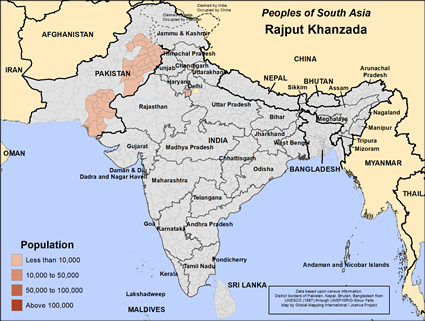The Rajput Muslims get their name from the larger Rajput people who are one of the four main Hindu divisions of South Asia peoples. In Sanskrit Rajput means, "son of a ruler or king." The Rajput fall into the second highest caste of Hinduism, the Kshatriyas, one step below the Brahmins, the high priestly caste.
Legend has it that the Muslim community of Rajput is the descendant of Umrao Singh. Umrao had fought against a conquering Muslim ruler over the death of the ruler's son. However, after his release, Umrao was never restored to his Hindu Rajput community and as an outcast, formed his own Muslim Rajput community. Over the centuries, the Rajputs acquired land as a payment for their military service to the rulers of South Asia.
Though there are a few Hindu Rajput communities in Pakistan, most of them are Sunni Muslim like the Pakistani majority. This includes the Khanzada Rajputs.
Today the Rajput Muslims of Pakistan are primarily an agricultural community. Some educated Rajputs operate at the top level of Pakistani society as professors, entertainers, athletes, and business owners.
The Rajputs farm their land themselves and frequently hire lower caste people to help them. The Rajputs are traditionally the landowner caste of Pakistan. Those who lose their land become employed in service and even wage labor jobs. Rajput women can often be found weaving, embroidery and in the making of handkerchiefs. Taking care of children is primarily the women's responsibility. Having many children, especially sons, is seen as a blessing from Allah.
For women, toe-rings, nose-pins and glass bangles are common symbols for being married. The Muslim Rajputs marry within their group. A man may have up to four wives if he can afford them.
The Rajputs are non-vegetarian but they avoid beef and pork. They enjoy foods like wheat, rice, vegetables and dairy products. The Pakistani Rajputs are Sunni Muslims but they are influenced by Hindu culture and practices.
The military tradition is still strong among the Rajputs. Many Rajputs serve today in the Pakistani Armed Forces.
The Khanzada Rajputs are Sunni Muslims who believe that the supreme God, Allah, spoke through his prophet, Mohammed, and taught mankind how to live a righteous life through the Koran and the Hadith. To live a righteous life, you must utter the Shahada (a statement of faith), pray five times a day facing Mecca, fast from sunup to sundown during the month of Ramadan, give alms to the poor, and make a pilgrimage to Mecca if you have the means. Muslims are prohibited from drinking alcohol, eating pork, gambling, stealing, slandering, and making idols. They gather for corporate prayer on Friday afternoons at a mosque, their place of worship.
The two main holidays for Sunni Muslims are Eid al Fitr, the breaking of the monthly fast and Eid al Adha, the celebration of Abraham's willingness to sacrifice his son to Allah.
Sunni religious practices are relatively simple. They believe that Allah has pre-determined our fates; they minimize free will.
In most of the Muslim world, people depend on the spirit world for their daily needs since they regard Allah as too distant. Allah may determine their eternal salvation, but the spirits determine how well we live in our daily lives. For that reason, they must appease the spirits. They often use charms and amulets to help protect themselves from evil spiritual forces.
As people of influence and social status, the Rajputs are a key Pakistani people to reach with the gospel. Praise God that some Hindu Rajputs have become followers of Christ, but there are few if any among the Muslim Rajput. Pride at one's high place in society can be a hindrance to following Isa or Jesus.
Pray the Khanzada would understand they can enjoy abundant life if they put their trust in Jesus Christ.
Pray for the Lord to intervene in their families, calling people to his side and blessing them in every way.
Pray for loving workers to go to the Khanzada Rajputs.
Pray for their hearts to be drawn to the Lord Jesus Christ.
Pray for a church planting movement to thrive in their communities in this decade.
Scripture Prayers for the Rajput Khanzada in Pakistan.
https://en.wikipedia.org/wiki/Baloch_people
https://www.britannica.com/topic/Baloch
https://www.atlasofhumanity.com/baloch
https://www.quora.com/What-is-your-opinion-about-Baloch-people
| Profile Source: Joshua Project |











